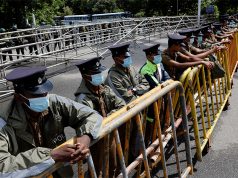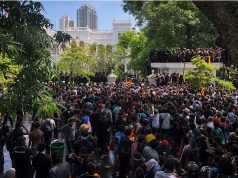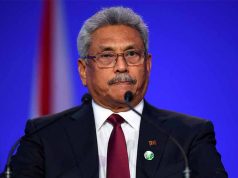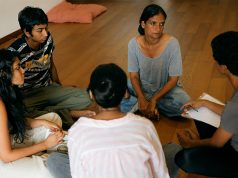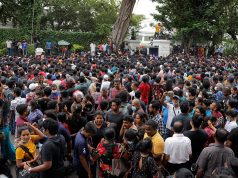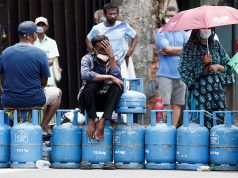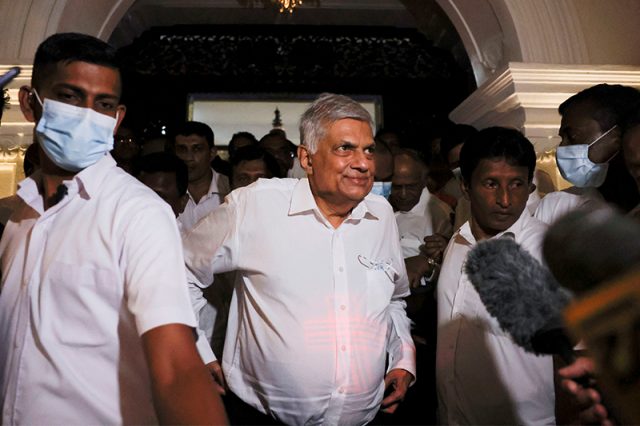
- Acting president wins 134 votes in 225-member parliament
- Wickremesinghe calls for unity in the face of challenges
- Bailout negotiations can be completed quickly -IMF before vote
COLOMBO — Sri Lankan lawmakers voted in acting President Ranil Wickremesinghe as the new president on Wednesday, hoping his long experience in government can help pull the country out of a crippling economic and political crisis.
The six-time prime minister won 134 votes in the 225-member parliament, despite public anger with the ruling elite after months of severe shortages of fuel, food and medicines. A popular uprising ousted his predecessor Gotabaya Rajapaksa last week.
“I would like to bring everyone together so that a national consensus is formed as to the way forward,” Wickremesinghe, 73, told reporters after praying at Colombo’s old Buddhist Gangaramaya Temple.
He denied being close to the Rajapaksa clan, seven of whose members were in the government as of April before street protests started forcing them out.
“I am not a friend of the Rajapaksas. I am a friend of the people,” said Wickremesinghe, who is expected to be sworn in by the chief justice on Thursday.
Wickremesinghe is unpopular among some protesters who stormed his official residence this month when he was prime minister and burnt down his private house.
But the response to his win was broadly muted, with only around 100 people gathered on the steps of the presidential secretariat, albeit with some vowing to focus on dislodging him.
“We’re shocked. He’s a person handling things in a very cunning way,” protester Damitha Abeyrathne said. “He will start controlling us in a different way. As protesters, we will start our struggle again.”
Many of the hundreds of thousands who poured into the streets to force the ouster of Rajapaksa had wanted Wickremesinghe gone too, labeling him an ally of the Rajapaksa family.
But one organizer of previous protests, Chameera Dedduwage, said Rajapaksa’s removal had been one of the movement’s goals, and protesters would have to be satisfied with achieving it.
Wickremesinghe took over as acting president last week, after Rajapaksa fled on a military plane to the Maldives before taking a commercial flight to Singapore.
The other key candidate in Wednesday’s contest, ruling party lawmaker Dullas Alahapperuma, received 82 votes. A third candidate, Anura Kumara Dissanayaka, got just three. Two lawmakers did not vote and four votes were ruled invalid.
Bail out
Alahapperuma, although more acceptable to the protesters and the opposition, has no experience of governing at the top level in a country now effectively bankrupt and desperate for an IMF bailout.
The head of the IMF, Kristalina Georgieva, told the Nikkei newspaper before the vote, that the fund was looking forward to engaging with Sri Lanka’s new leadership.
“The moment there is a government that we can continue our discussions with, our team will be there,” she said, adding that she was “very hopeful” of completing program negotiations as quickly as possible, with some good technical groundwork done.
Sri Lankan shares .CSE closed higher on Wednesday, while its government bonds which are now in default saw a very modest rise.
Petar Atanasov, co-head of sovereign research at specialist distressed debt fund Gramercy, said Wickremesinghe’s appointment was a potential positive as he strongly backed IMF support, although it was subject to him being able to control the country.
“We are concerned that for the population he represents the status quo, and I’m not sure the people are ready to accept that.”
‘People deserve fuel, transportation’
Wickremesinghe said earlier this week that by the time he joined the Rajapaksa government as prime minister in May, the economy had already collapsed.
Since then, daily power cuts had been reduced to three hours from five and fertilizer distributed to farmers suffering from an earlier ban on the commodity, he added.
Wickremesinghe had unsuccessfully ran for president twice before but secured enough backing this time from lawmakers despite controlling just one seat, as leader of the United National Party.
“This is now an outdated parliament with a mandate given for an ousted president,” said opposition leader Sajith Premadasa.
However, he added, “You can’t have an anarchical country. We must work according to the constitution. As the opposition, we will give our utmost support” for any plan to fix the economy.
The tourism-dependent economy was hammered first by the COVID-19 pandemic and then a fall in remittances from overseas Sri Lankans. The ban on chemical fertilizers hit output before it was reversed late last year.
Populist tax cuts by the Rajapaksas in 2019 hurt government finances, while shrinking foreign reserves slashed imports of fuel, food and medicine.
Petrol has been severely rationed. Headline inflation hit 54.6% last month and the central bank has warned that it could rise to 70% in coming months.
“People deserve fuel, transportation, we deserve anything citizens need,” said Kasumi Ranasinghe Arachchige, 26. “Until we see no one in Sri Lanka is struggling, the protest continues.”
Another protester, Buwanaka Perera, said, “The occupy movement shall continue, the struggle shall continue. We will continue the protest until Ranil goes home.”
—Reporting by Uditha Jayasinghe, Devjyot Ghoshal and Alasdair Pal; Additional reporting by Sunil Kataria, Adnan Abidi, Chris Thomas, Shilpa Jamkhandikar, Anirudh Saligrama, Waruna Karunatilake, Tanvo Mehta and Marc Jones in London; Writing by Krishna N. Das; Editing by Clarence Fernandez, Nick Macfie and Lisa Shumaker




